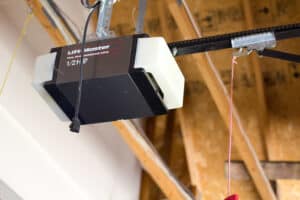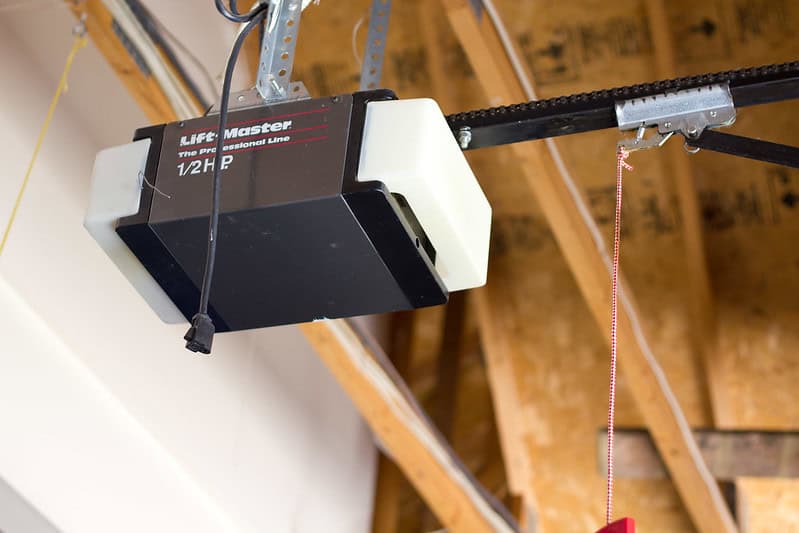Like any machine, your garage door opener can break or wear out and need replacing, but if it was installed before you moved into your house, you may not know its type or size. To get the best device, you’ll need to understand several things before you purchase a new unit. Join us as we explain the various types of garage door openers and the importance of selecting the right one for your garage door.
What Size Garage Door Opener Do You Need?
 The garage door opener size refers to the horsepower the motor generates, not the size of your garage door, although the size of your door does impact the size motor you need. Heavier doors require more horsepower, while lighter doors need less.
The garage door opener size refers to the horsepower the motor generates, not the size of your garage door, although the size of your door does impact the size motor you need. Heavier doors require more horsepower, while lighter doors need less.
You’ll want to find a garage door opener type with the right horsepower to operate your door efficiently and safely. Start by evaluating your door opening size. Most garage doors come in a single- or two-car size. Single-car garage doors typically measure 9 feet wide by 7 feet high, and two-car garage doors run 16 feet by 7 feet.
You also need to know what material was used to make the door. Doors come in wood, steel, and fiberglass, and the size of opener you need will depend on the material of your door.
Why Size Matters: Efficiency and Safety
Garage door opener sizes matter because a motor that’s too small will struggle to open your garage and likely wear out faster. Installing a motor that’s too large will do the job but wastes electricity, costing you money.
Types of Garage Door Openers and Compatible Sizes
Different types of garage door openers have pros and cons depending on your situation. Modern garage door openers run on alternating current (AC) or direct current (DC) power. Garage door opener manufacturers rate AC units in horsepower and DC units in newtons. Horsepower ratings for most residential garage door openers using AC use one-third, one-half, or three-quarter horsepower motors, whereas most DC residential motors operate with a 500- or 700-newton motor.
The more power a motor has, the more weight it can lift safely, and more powerful motors generally last longer due to more sturdy construction. If you frequently use your garage door, opting for a more powerful motor could be a more prudent decision in the long run.
Determining the Right Horsepower for Your Garage Door
Choosing a garage door opener starts with the door’s material and size. A standard garage door typically measures 9 feet wide by 7 feet tall, requiring a one-half horsepower AC motor or a 500-newton DC motor. You might have a slightly smaller door if you own an older home.
If you have a double garage door, it probably measures 16 feet wide by 7 feet tall. Garage doors this size generally need a three-quarter horsepower AC motor or a 700-newton DC motor. Some taller garage doors made for campers and RVs will need a more powerful motor to lift the greater weight.
When you consider door material, weight becomes a factor. Aluminum and vinyl doors cost much less, and many people choose them based on price. Doors made from these materials will do fine with a one-third or one-half horsepower AC motor or a 500-newton DC motor.
If you have insulated garage doors to keep the cold weather outside, steel doors for added security, or solid wood doors for enhanced curb appeal, you’ll need to factor this into your decision. Insulated, steel, and wooden doors add weight and will require a more powerful three-quarter horsepower AC motor or 700-newton DC motor. If you have questions about door materials and garage door installation, feel free to contact us. One of our friendly, knowledgeable staff members will be happy to help.
AC vs. DC Openers
Understanding the differences between AC and DC openers when buying a new garage door opener will help you make the right decision. AC openers can be found in most residential homes. These motors have been around much longer and typically cost less than DC motors. AC motors tend to be more powerful and have fewer maintenance issues, making them suitable choices for heavier garage doors, but they make more noise than DC motors.
An AC motor delivers constant power that opens doors smoothly and quickly. On the other hand, DC motors start slow before the power ramps up and slows again as the door nears its fully open or closed position. Using a DC motor in your garage door opener results in slower opening and closing. However, your DC motor will run quieter and open and close your garage doors more gently. Softer opening and closing will prolong the life of your doors by reducing the strain on components, hardware, and mechanisms that lead to breakdown.
DC openers typically have a battery backup, so when a winter storm blows through and knocks out power, you can still operate your garage door with the push of a button. AC-powered openers require you to manually open the door by pulling a lever and lifting it yourself. DC openers also typically have remote capabilities, meaning you can open your door using a smartphone app.
Contact Overhead Garage Door for Opener Installation Today
If you’re shopping for a garage door opener in the Greater Chicago area, have questions on how to size a garage door opener, or need professional installation, Overhead Garage Door can help. You can explore your garage door opener installation options online or call us at 888-459-3720 to speak with one of our experts. We’ll ask you a few questions to determine your needs, cross-reference your requirements with our garage door opener sizing chart, and recommend the right opener for your garage.
Lift Master 1/2 HP Garage Door Opener by Dave Dugdale is licensed with CC BY-SA 2.0

